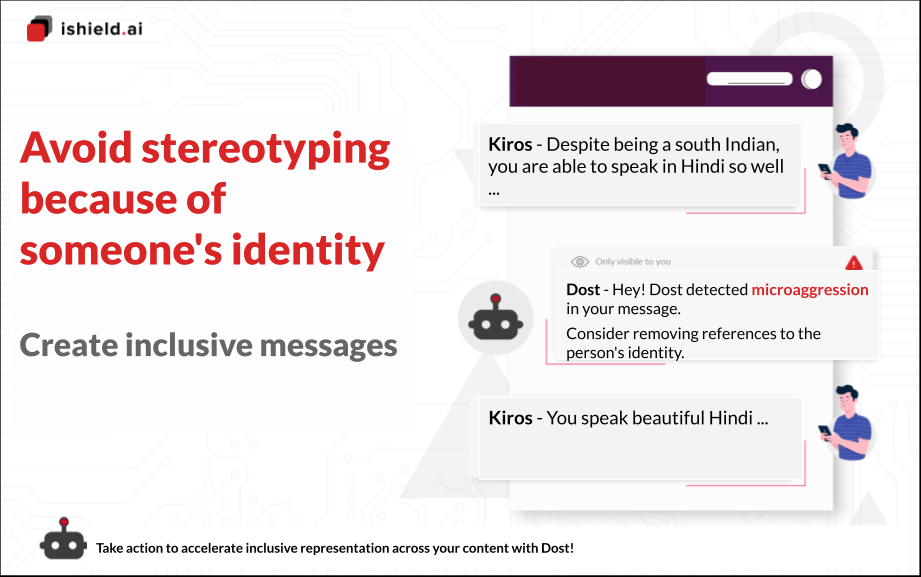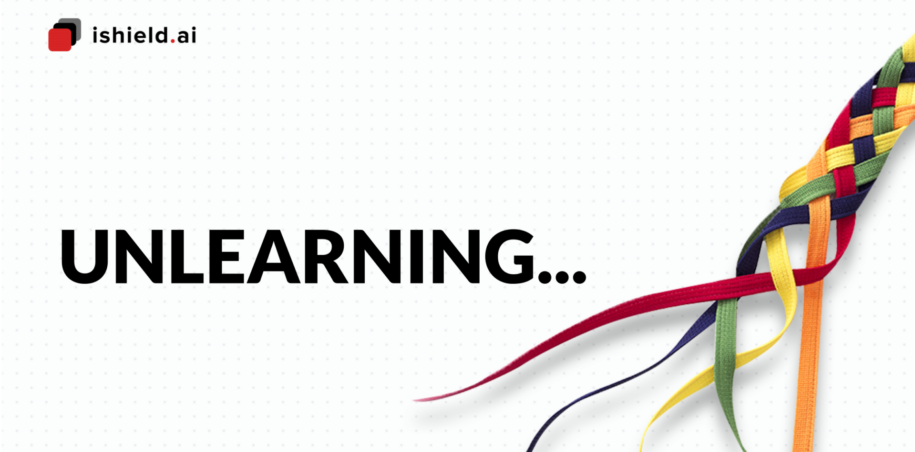We use the Zomato customer support incident to bring attention to inclusive representation. There are three questions that arise from this incident.
- How do you categorize the messages sent by the customer service agent?
- What actions (if at all) should be taken in this case?
- Are there technologies to tackle such issues?
Categorizing the issue
People have called it a mistake, ignorance or discrimination. The word “mistake” seems to be most widely associated with this incident. Before any issue is tackled, it is important that we first recognize and classify the issue properly, and then take suitable actions. We need to look at; a) the outcome (in this case the actual message), and b) what led to the outcome.
- Classifying the message: It’s not a mistake. It’s microaggression. In this case, it is prejudicial treatment of a customer due to language.
- What leads to microaggression: This is due to unconscious bias and prejudice. In this case, expecting the customer to change their behaviour due to your own preconceived notions not based on verifiable facts.
“Ignorant silly mistake” is the official stance taken by Zomato. This is probably the most popular and easy excuse used by perpetrators of aggression towards minority subgroups (of gender, race, religion, sexual orientation, language etc). McKinsey has done fantastic studies on microaggressions and they provide examples of how these manifest, including:
- Not receiving credit for your ideas
- Being asked to speak as a representative for a group of people like you.
- Being coached to communicate in a way that feels inauthentic of who you are.
- Needing to correct others’ assumptions about your personal life.
- Hearing derogatory comments or jokes about people like you.
- Being excluded from social events.
- Receiving comments about the way you dress.
- Receiving suggestions about switching to a less demanding job in the organization.
Brushing aside the microaggressions as ignorant silly mistakes also takes away any opportunity to learn and course correct.
Action to be taken
Most microaggressions occur due to unconscious biases. Organizations invest in training their employees in identifying and eliminating unconscious biases in-order to create a more inclusive culture, where the everyones (customers, talent and people) authentic self is welcomed.
When microaggressions occur, it not only impacts the person who it is addressed to, but it impacts all people who also identify / empathize with the said customer. Hence, the strong retribution (#Reject_Zomato).
We all have unconscious biases. Hence, we do believe that terminating the employment of this agent, or #Reject_Zomato is an extreme and unwarranted action. Also, these actions won’t help, because it will occur again and no one is immune to unconscious biases (read the Wells Fargo incident or Unacademy incident here).
For a short term fix, Zomato has already apologized for this incident and promised to take necessary steps in sensitising their staff. For a more sustained movement, we recommend Zomato invests in building systems that can help correctly recognize the issues for what they are, conduct periodic sensitization training, putting together guidelines, and deploying technologies to check content that you put out.
Technology to tackle such issues

Check out Dost (https://krita.ai/dost) that detects toxicity, culture blunders, microaggressions and bias in internal and external communications (including customer support conversations) and nudges people to eliminate those. Dost API can be integrated with any enterprise communication, customer support and collaboration platform.
Quick definitions
Unconscious bias: are social stereotypes about certain groups of people that individuals form outside their own conscious awareness.
Prejudice: Preconceived notion that is not based on facts, reason or actual experience.
Microaggression: the unjust or prejudicial treatment of different categories of people, especially on the grounds of race, age, gender, language, ethnicity, geography, or disability.
Here is a fantastic crossword puzzle that the team at Embrace consulting has put together that explores the various terms we use in D&I training – https://crosswordlabs.com/embed/diversity-inclusion-equity.
For further reading on inclusive representation in content, please check out:
https://www.linkedin.com/pulse/weekend-read-top-10-research-articles-why-inclusive-representation-/
About us
At krita.ai, our purpose is to make online content safer, inclusive and human. We develop AI SaaS products that empower enterprises to take action and accelerate inclusive representation in their content. To know more about how krita.ai can help your organization, start here.

